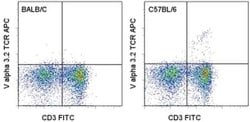Learn More
Invitrogen™ TCR V alpha 3.2 Monoclonal Antibody (RR3-16), APC, eBioscience™



Description
Description: This RR3-16 monoclonal antibody reacts with the mouse T cell receptor (TCR) V alpha 3.2 chain. Composed of an alpha and beta chain, TCR specificity is typically determined by Va, Ja, Vb, Db, and Jb gene rearrangement. The RR3-16 antibody recognizes the V alpha 3.2 chain on T cells from mouse strains bearing the b (e.g., C57BL/6) or c haplotype (e.g., SJL, SWR, and NOD) in the Tcra gene complex. The V alpha 3.2 chain is absent in mice with the a (e.g., Balb/c, AKR, C3H) and d (e.g., DBA/1 and DBA/2) haplotypes. Studies demonstrate that the V alpha 3.2 TCR is more highly expressed on CD8+ T cells. Applications Reported: This RR3-16 antibody has been reported for use in flow cytometric analysis. Applications Tested: This RR3-16 antibody has been tested by flow cytometric analysis of mouse lymph node. This can be used at less than or equal to 0.25 μg per test. A test is defined as the amount (μg) of antibody that will stain a cell sample in a final volume of 100 μL. Cell number should be determined empirically but can range from 10^5 to 10^8 cells/test. It is recommended that the antibody be carefully titrated for optimal performance in the assay of interest. Excitation: 633-647 nm; Emission: 660 nm; Laser: Red Laser. Filtration: 0.2 μm post-manufacturing filtered.

Specifications
Specifications
| Antigen | TCR V alpha 3.2 |
| Applications | Flow Cytometry |
| Classification | Monoclonal |
| Clone | RR3-16 |
| Concentration | 0.2 mg/mL |
| Conjugate | APC |
| Formulation | PBS with 0.09% sodium azide; pH 7.2 |
| Gene Alias | TCR V alpha3.2; TCRV alpha 3.2; TCRV alpha3.2; Va3.2; Valpha3.2 |
| Host Species | Rat |
| Purification Method | Affinity chromatography |
| Show More |
Safety and Handling
By clicking Submit, you acknowledge that you may be contacted by Fisher Scientific in regards to the feedback you have provided in this form. We will not share your information for any other purposes. All contact information provided shall also be maintained in accordance with our Privacy Policy.
